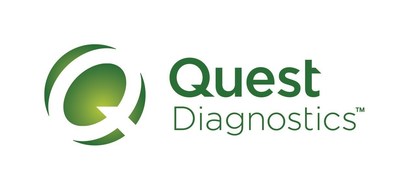New Study Demonstrates Accuracy of Two Quest AD-Detect® Tests for Alzheimer's Disease Diagnosis
Werte in diesem Artikel
The Quest AD-Detect® blood-based test panels deliver confirmatory accuracy, potentially supporting reduced reliance on PET-imaging confirmation
SECAUCUS, N.J., Oct. 27, 2025 /PRNewswire/ -- Two blood tests, each involving multiple biomarkers, are highly accurate at identifying Alzheimer's disease pathology in symptomatic patients, supporting diagnosis, according to a new study in Neurology® Clinical Practice, a publication of the American Academy of Neurology.
Conducted by scientists with Quest Diagnostics (NYSE: DGX) and 1Florida ADRC, University of Florida, the study suggests both tests may fulfill guideline-based criteria for confirming Alzheimer's disease without follow-up tests, such as amyloid positron emission tomography (PET) scan or cerebrospinal fluid (CSF) tests.
"This study demonstrates that scalable blood-based testing can meet rigorous standards for establishing Alzheimer's disease pathology, supporting diagnosis and advancing patient care for Alzheimer's disease in the intended use patients," said Michael Racke, MD, a board-certified neurologist and Senior Medical Director of Neurology, Quest Diagnostics. "Our analysis also suggests that blood-based testing can achieve a rate of indeterminate, or unclear, results, as low as 10%. A low indeterminate rate means more providers and patients may confidently use test results to help make clinical decisions in real-world settings."
The study evaluated two blood-based tests developed by Quest Diagnostics. One of the tests produces a likelihood score based on results of circulating blood levels of the biomarkers amyloid beta (AB) 42/40, phosphorylated tau (p-tau) 217 and ApoE4 proteotype (reflecting inherited high-risk APOE4 alleles). Quest plans to launch a version of this test in the first quarter of 2026. The study also evaluated a test that includes AB 42/40 and p-tau217 but not ApoE4. The company launched a version of this test (called AD-Detect™ ABeta 42/40 and p-tau217 Evaluation panel) in April 2025.
Both tests were evaluated at 91% sensitivity and 91% specificity to meet acceptable performance of confirmatory blood biomarker tests in an intended-use population of 215 patients with mild cognitive impairment (MCI) or Alzheimer's disease in which 46% were amyloid PET-positive. Both the Alzheimer's Association (AA) and the Global CEO Initiative on Alzheimer's Disease (CEOi) recommend that a blood-based test for confirmatory use without follow-up testing have a sensitivity and specificity of approximately 90%, comparable to CSF testing. (The AA recommendations pertain to patients with objective cognitive impairment presenting to specialized care settings, while the CEOi recommendations pertain to patients for whom amyloid positivity is highly likely to be greater than 50%.)
With cutoffs of 91% sensitivity and 91% specificity, the test combining AB 42/40, p-tau217 and ApoE4 blood tests had a positive predictive value (PPV, or evidence of a true positive result) of 88% and a negative predictive value of 91% (NPV, or evidence of a true negative result) in the intended-use population. A panel that did not include ApoE4 had slightly lower PPV (87%) and no change in NPV (91%). Predictive values can vary based on prevalence of disease in a population and may therefore provide more useful insight than sensitivity and specificity alone.
In addition, the indeterminate rate was 10% for the test with all three biomarkers and 15% for the test without ApoE4. The CEOi recommends that blood-based tests for confirmatory use classify no more than 15%-20% of individuals with an indeterminate result.
The findings were first presented during an oral presentation at the American Academy of Neurology (AAN)'s Annual Meeting in San Diego in April 2025.
Quest performs AB 42/40 and ApoE4 proteotype using proprietary tandem mass spectrometry techniques and p-tau271 using a third-party immunoassay. Quest AD-Detect tests are intended for use by physicians to evaluate patients with symptoms of cognitive impairment or Alzheimer's disease.
Nearly 7 million Americans have been diagnosed with Alzheimer's disease, the most prevalent form of dementia, a number projected to reach 14 million by 2060. Approximately 12-18% of adults over the age of sixty are living with mild cognitive impairment, a potential sign of AD. Ninety-four percent of physicians say blood tests would be more cost effective for the healthcare system compared to more invasive methods of detection (e.g., CSF lumbar puncture, PET imaging), according to a report from Quest.
Quest is committed to developing innovative advanced diagnostics to aid in evaluating Alzheimer's disease and other brain diseases. For more information, visit www.QuestForTheCure.com.
About Quest Diagnostics
Quest Diagnostics works across the healthcare ecosystem to create a healthier world, one life at a time. We provide diagnostic insights from the results of our laboratory testing to empower people, physicians and organizations to take action to improve health outcomes. Derived from one of the world's largest databases of de-identifiable clinical lab results, Quest's diagnostic insights reveal new avenues to identify and treat disease, inspire healthy behaviors and improve healthcare management. Quest Diagnostics annually serves one in three adult Americans and half the physicians and hospitals in the United States, and our nearly 55,000 employees understand that, in the right hands and with the right context, our diagnostic insights can inspire actions that transform lives and create a healthier world. www.QuestDiagnostics.com.
![]() View original content to download multimedia:https://www.prnewswire.com/news-releases/new-study-demonstrates-accuracy-of-two-quest-ad-detect-tests-for-alzheimers-disease-diagnosis-302594686.html
View original content to download multimedia:https://www.prnewswire.com/news-releases/new-study-demonstrates-accuracy-of-two-quest-ad-detect-tests-for-alzheimers-disease-diagnosis-302594686.html
SOURCE Quest Diagnostics
Übrigens: Quest Diagnostics und andere US-Aktien sind bei finanzen.net ZERO sogar bis 23 Uhr handelbar (ohne Ordergebühren, zzgl. Spreads). Jetzt kostenlos Depot eröffnen und Neukunden-Bonus sichern!
Ausgewählte Hebelprodukte auf Quest Diagnostics
Mit Knock-outs können spekulative Anleger überproportional an Kursbewegungen partizipieren. Wählen Sie einfach den gewünschten Hebel und wir zeigen Ihnen passende Open-End Produkte auf Quest Diagnostics
Der Hebel muss zwischen 2 und 20 liegen
| Name | Hebel | KO | Emittent |
|---|
| Name | Hebel | KO | Emittent |
|---|
Nachrichten zu Quest Diagnostics Inc.
Analysen zu Quest Diagnostics Inc.
| Datum | Rating | Analyst | |
|---|---|---|---|
| 25.06.2018 | Quest Diagnostics Overweight | Barclays Capital | |
| 20.10.2017 | Quest Diagnostics Buy | Mizuho | |
| 25.07.2017 | Quest Diagnostics Buy | Mizuho | |
| 05.06.2017 | Quest Diagnostics Buy | Mizuho | |
| 12.05.2017 | Quest Diagnostics Hold | Argus Research Company |
| Datum | Rating | Analyst | |
|---|---|---|---|
| 25.06.2018 | Quest Diagnostics Overweight | Barclays Capital | |
| 20.10.2017 | Quest Diagnostics Buy | Mizuho | |
| 25.07.2017 | Quest Diagnostics Buy | Mizuho | |
| 05.06.2017 | Quest Diagnostics Buy | Mizuho | |
| 26.04.2017 | Quest Diagnostics Buy | Mizuho |
| Datum | Rating | Analyst | |
|---|---|---|---|
| 12.05.2017 | Quest Diagnostics Hold | Argus Research Company | |
| 07.03.2017 | Quest Diagnostics Equal Weight | Barclays Capital | |
| 21.10.2016 | Quest Diagnostics Neutral | Mizuho | |
| 22.04.2016 | Quest Diagnostics Equal Weight | Barclays Capital | |
| 22.04.2016 | Quest Diagnostics Sector Perform | RBC Capital Markets |
| Datum | Rating | Analyst | |
|---|---|---|---|
Keine Analysen im Zeitraum eines Jahres in dieser Kategorie verfügbar. Eventuell finden Sie Nachrichten die älter als ein Jahr sind im Archiv | |||
Um die Übersicht zu verbessern, haben Sie die Möglichkeit, die Analysen für Quest Diagnostics Inc. nach folgenden Kriterien zu filtern.
Alle: Alle Empfehlungen


